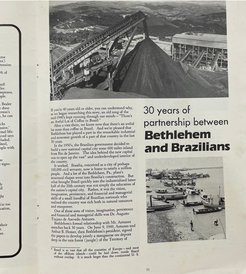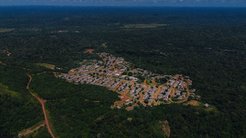Making Heritage in the Anthropocene: The Afterlife of Extractivist Cities in the Brazilian Amazon
From Berlin to Detroit, from Chernobyl to remote abandoned factories in Iceland, the so-called “ruins of modernity” (Pétursdóttir, 2013) invoke narratives of overexploitation, abandonment, loss, and waste. These sites, many of which were once home to extractivist projects, expose the pitfalls of modernity and a lack of balance with nature. At the same time, some of those places have been the target of contrasting heritagisation and place-making initiatives, exposing a global trend in considerations of how to remember monuments of industrialisation and their environmental impacts. They have also stimulated an academic debate which interrogates the place of heritage in the Anthropocene, as humanity starts facing climatic emergency, habitat destruction, and a significant decline in biodiversity (Harrison, 2015; Harrison and Sterling, 2020; Tornatore, 2017). This project inserts itself in this debate by discussing heritage discourses in the context of the Amazon Forest, where former 20th-century company towns are also being declared national heritage.
The Project
“Making Heritage in the Anthropocene: The Afterlife of Extractivist Cities in the Brazilian Amazon” is a PhD project which is part of the RESILIENT group financed by Gerda Henkel Foundation and housed in the DLU department. The project is also carried out within the TU Berlin Institute for Regional and Urban Planning Doctorate Program. This interdisciplinary PhD thesis is co-supervised by Stephanie Herold, Patrick Roberts and Danielle Heberle Viegas.
This PhD thesis is dedicated to investigating the transition from former company towns to current heritage sites in two extractivist projects in the Brazilian Amazon: Serra do Navio and Fordlândia. By relying on a multidisciplinary approach, integrating critical heritage studies, decolonial studies, environmental history and urban history, this research sheds light on the political role heritage narratives can assume in the face of the Anthropocene challenges and in the context of the world’s largest rainforest.
The project methodology includes archival research and ethnography, reaching out to local communities and institutional actors through formal and informal interviews. The research is structured into three parts, covering (1) the history of birth and decay of these company towns; (2) the institutional heritage narratives and existing counternarratives; and (3) the role played by heritage discourse in socio environmental policies in the region.
From “Islands of Development” to “Ruins of Modernity”: Discussing the Birth and Decay of Amazonian Company Towns

The first part of the research focuses on the history of these company towns, showcasing how they went from highly developed centres to impoverished ones. Seeking to fill a gap in existing scientific production, the history of these cities is inserted in the context of Amazon River Basin colonisation and its role in global commodities chains. Ultimately, they are presented as nodes within a broader colonial and neocolonial infrastructural network. Finally, analysing their decay encompasses both understanding the socio-environmental damages and engaging with debates around ruination, ruderal heritage, and heritage from and within the Anthropocene.
An Afterlife as Heritage: Narratives and Counternarratives in Extractivist Heritage Sites

The second part of this work is focused on the analysis of the institutional heritage narratives surrounding these sites, as well as the counter-narratives carried out by other social actors. Relying on the theoretical framework discussed in the first part, as well as the concept of Authorised Heritage Discourse set by Laurajane Smith (2008), the project analyses the documents produced by the Brazilian National Heritage Institute (IPHAN) and conducts interviews with representatives from the institution. The goal is to assess the official heritage discourse behind the protection of those sites. Moreover, existing local communities and former inhabitants of these company towns are contacted to assess the existing heritage counter-narratives. This allows to discuss the connections and disconnections between heritage according to official institutions and heritage lived by the people.
The Work of Heritage Entanglements Between Environmental Policy and Heritage Discourse
This part of the research focuses on analysing the existing environmental policies for each former company region, assesses the challenges faced by the reserves neighbouring these former extractivist projects. The goal is to identify how potential new extractivist projects impact these reserves, the environmental education policies proposed, and if/how the company town heritage is taken into account when setting these education measures. The goal is to assess the connections between official heritage discourse and local environmental policies, aiming to set a path in which entanglements could be made to impact the territory positively. This chapter aims to integrate local environmental and cultural heritage policies, contributing to overcoming the natural and cultural heritage divide to assemble ways of making heritage that help face the Anthropocene.












